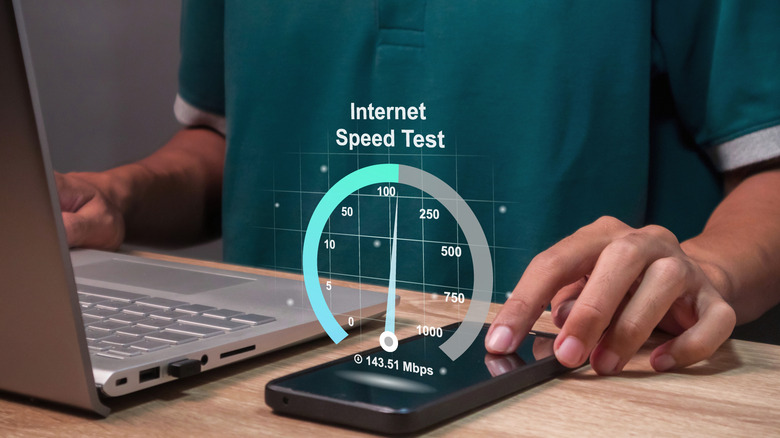How Much Internet Speed Do You Actually Need For Everyday Use?
Using the internet on a daily basis has become a crucial part of nearly every person's life. Whether you're checking your e-mail on your phone, streaming a movie on your television, or working from home on your laptop, you need the internet. It's become such a part of the firmament of life that things that once didn't require an internet connection now do, as just about any person who regularly plays video games can tell you. So, when you are signing up with a new internet service provider, arguably the main thing you need to consider when choosing a plan is what kind of internet speed you need to comfortably go through your day-to-day life.
If there was a one-size-fits-all solution to this, that would be great, but there isn't. You have to take many factors into consideration when choosing how many Mbps of internet speed you need. First and foremost, you need to think about what you regularly use the internet for. Are you just doing basic web searches, or are you streaming movies and television shows in 4K on four different TVs at the same time? You also can't just think about your own personal internet usage. You have to consider every person in your household's daily usage as well. Beyond the number of people, there is also the number of individual devices. There may be four people in the house, but each one might have eight devices connected to the internet at the same time. Once you know all of these circumstances, you can start pinpointing exactly what internet speed you need.
Crunching the numbers
A great base starting point to determine what internet speed you require is 100 Mbps. Ookla, the company behind the popular Speedtest.com website to see how fast your internet is, has determined that 100 Mbps internet is good for things like 4K video streaming, multiplayer gaming, and being able to download large files at a decent clip. This speed is good if you have several devices connected to the internet at the same time. For people who are occasionally online in different forms, this is a great option.
For those who only have a couple of internet-enabled devices that are occasionally used, you can maybe afford to go to a lower speed, be that 50 Mbps or even 20 Mbps. However, you may experience some troubles with streaming content buffering or perhaps some video games lagging with these low speeds. Importantly, these numbers are assuming that the internet is running at peak performance. There may be times when an internet provider will cap your internet speed based on the overall usage in your area.
If you have many devices in constant use — especially in a large household — being able to get a speed of at least 1 Gbps would be a major benefit, and if you have the ability to go higher, you maybe should. With these speeds, you will almost never find yourself experiencing any kind of lag. These higher speeds may be a little harder to come by based on your location and what internet service providers are available to you though.

